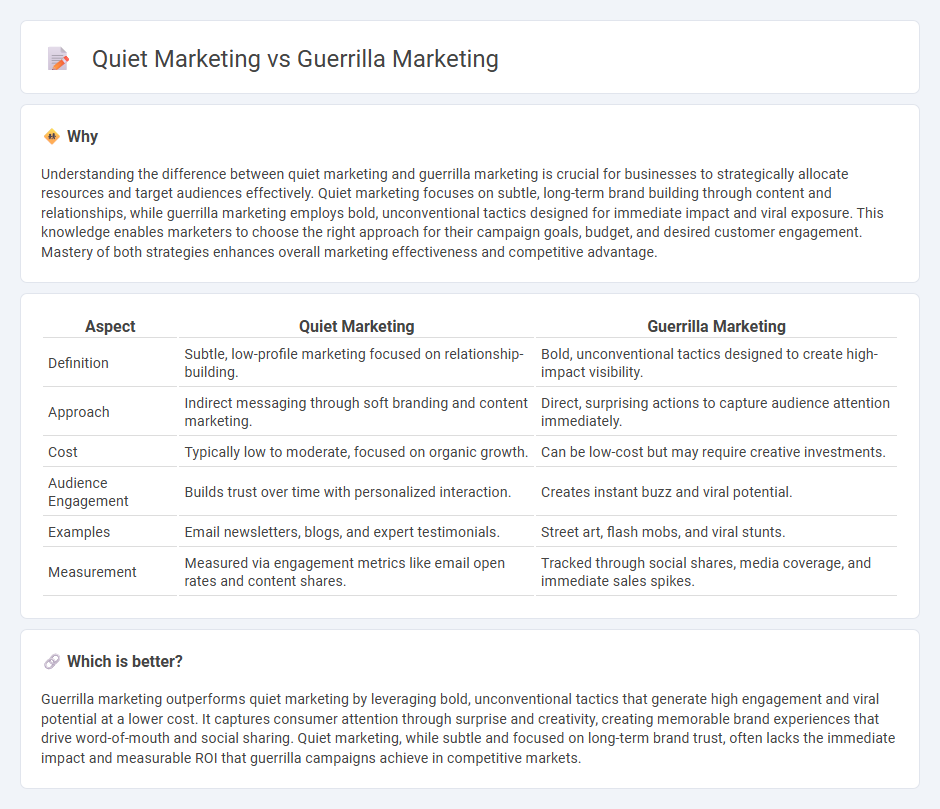
Quiet marketing focuses on subtle, low-key strategies that build brand awareness through consistent, understated messaging and customer engagement. Guerrilla marketing relies on unconventional, bold tactics designed to create high-impact, memorable experiences that capture immediate attention. Explore both approaches to determine which marketing style aligns best with your brand goals.
Why it is important
Understanding the difference between quiet marketing and guerrilla marketing is crucial for businesses to strategically allocate resources and target audiences effectively. Quiet marketing focuses on subtle, long-term brand building through content and relationships, while guerrilla marketing employs bold, unconventional tactics designed for immediate impact and viral exposure. This knowledge enables marketers to choose the right approach for their campaign goals, budget, and desired customer engagement. Mastery of both strategies enhances overall marketing effectiveness and competitive advantage.
Comparison Table
| Aspect | Quiet Marketing | Guerrilla Marketing |
|---|---|---|
| Definition | Subtle, low-profile marketing focused on relationship-building. | Bold, unconventional tactics designed to create high-impact visibility. |
| Approach | Indirect messaging through soft branding and content marketing. | Direct, surprising actions to capture audience attention immediately. |
| Cost | Typically low to moderate, focused on organic growth. | Can be low-cost but may require creative investments. |
| Audience Engagement | Builds trust over time with personalized interaction. | Creates instant buzz and viral potential. |
| Examples | Email newsletters, blogs, and expert testimonials. | Street art, flash mobs, and viral stunts. |
| Measurement | Measured via engagement metrics like email open rates and content shares. | Tracked through social shares, media coverage, and immediate sales spikes. |
Which is better?
Guerrilla marketing outperforms quiet marketing by leveraging bold, unconventional tactics that generate high engagement and viral potential at a lower cost. It captures consumer attention through surprise and creativity, creating memorable brand experiences that drive word-of-mouth and social sharing. Quiet marketing, while subtle and focused on long-term brand trust, often lacks the immediate impact and measurable ROI that guerrilla campaigns achieve in competitive markets.
Connection
Quiet marketing and guerrilla marketing both focus on subtle, unconventional strategies to capture audience attention without relying on traditional advertising channels. These approaches emphasize creativity, low-cost execution, and targeted engagement, leveraging word-of-mouth and unexpected brand interactions to enhance customer connection. By prioritizing authenticity and surprise, they create memorable experiences that foster brand loyalty and organic growth.
Key Terms
Guerrilla Marketing:
Guerrilla marketing employs unconventional, low-cost strategies designed to create high-impact brand awareness through surprise and creativity, often in public spaces. It leverages emotional engagement and viral potential, making it ideal for startups and businesses aiming for rapid visibility without extensive budgets. Discover more about how guerrilla marketing can revolutionize your promotional efforts.
Ambush
Ambush marketing strategically leverages high-visibility events without official sponsorship, creating impactful brand associations at minimal cost. This guerrilla tactic contrasts with quiet marketing, which relies on subtle, low-key branding efforts to build long-term consumer trust. Explore how ambush marketing can maximize brand exposure in competitive spaces.
Unconventional
Guerrilla marketing leverages bold, unconventional tactics to create memorable brand experiences through surprise and creativity, often utilizing public spaces and interactive campaigns. Quiet marketing employs subtle, low-key strategies that build trust and engagement over time, focusing on word-of-mouth, content marketing, and niche community connections. Explore how these distinctive approaches can elevate your marketing strategy by delving deeper into their unique advantages and applications.
Source and External Links
Guerrilla marketing - Wikipedia - Guerrilla marketing is an advertising strategy using surprise and unconventional interactions to promote products, aiming to create memorable experiences and word-of-mouth buzz, often with low cost and high creativity.
Guerrilla marketing | EBSCO Research Starters - Guerrilla marketing is an unconventional, low-budget promotional strategy that aims to generate buzz through unique, attention-grabbing tactics focusing on creativity and engaging specific audiences, especially younger consumers.
What Is Guerrilla Marketing? 4 Types and Examples to Delight ... - Guerrilla marketing uses unconventional and inventive displays in public spaces to surprise and engage potential customers, creating impactful experiences on small budgets that spread via word of mouth and social media.
 dowidth.com
dowidth.com